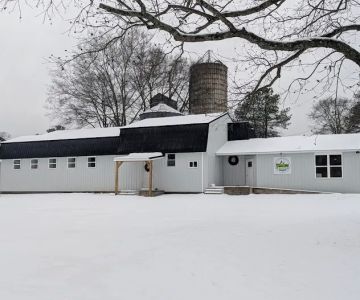Can a Non-Veterinarian Perform Ultrasound on a Farm in Wisconsin?
- 1. Understanding the Role of Ultrasound in Farm Animal Care
- 2. Legal Considerations for Non-Veterinarians Performing Ultrasound in Wisconsin
- 3. Training Requirements for Non-Veterinarians Using Ultrasound Technology
- 4. The Benefits of Using Ultrasound on Farms
- 5. Case Studies: Successful Ultrasound Use on Wisconsin Farms
- 6. How to Get the Right Equipment for Farm Ultrasound
- 7. Ethical and Safety Concerns in Non-Veterinarian Ultrasound Use
- 8. When to Consult a Veterinarian for Ultrasound in Farm Settings
- 9. Future of Ultrasound Technology on Farms
1. Understanding the Role of Ultrasound in Farm Animal Care
Ultrasound technology plays a crucial role in veterinary medicine, including in farm settings. For farmers, ultrasound is an invaluable tool for monitoring the health of livestock, particularly during pregnancy, to check for issues such as fetal health or complications. As an essential diagnostic tool, it allows farmers to make informed decisions on their animals' care without the need for invasive procedures.
2. Legal Considerations for Non-Veterinarians Performing Ultrasound in Wisconsin
In Wisconsin, as in many states, there are specific regulations that govern who can perform medical procedures on animals. While veterinary technicians and veterinarians have formal training and licensure to perform ultrasounds, the question arises: can a non-veterinarian perform ultrasound on a farm in Wisconsin? The answer largely depends on the scope of practice and local laws. In Wisconsin, non-veterinarians may be allowed to operate ultrasound equipment under specific circumstances, but it's typically under the supervision of a licensed veterinarian. It’s important to understand that performing diagnostic procedures without the proper training could be considered unauthorized practice of veterinary medicine, which could have legal consequences.
3. Training Requirements for Non-Veterinarians Using Ultrasound Technology
While non-veterinarians can use ultrasound equipment on farms in some cases, proper training is essential to ensure accuracy and safety. Many farms choose to train personnel, such as farm managers or veterinary technicians, in ultrasound technology. Various training programs are available to teach the basics of operating ultrasound machines, interpreting images, and understanding the physiological aspects of animals. However, it’s critical to note that non-veterinarians should never make diagnostic conclusions without consulting a licensed veterinarian. This training ensures that the ultrasound procedure is done effectively and safely while staying within legal boundaries.
4. The Benefits of Using Ultrasound on Farms
Ultrasound technology provides numerous benefits on farms. It allows farmers to monitor their animals’ health in real-time, especially when dealing with issues like pregnancy, tumors, or organ health. For example, ultrasound can help identify the number of fetuses in a pregnant cow, determine their health, and even predict calving dates. This information is invaluable for ensuring the well-being of the animals and maximizing farm productivity. Additionally, ultrasound is a non-invasive, safe, and effective method of gathering important diagnostic information that can improve animal care practices on the farm.
5. Case Studies: Successful Ultrasound Use on Wisconsin Farms
Across Wisconsin, many farmers have successfully incorporated ultrasound technology into their operations. For instance, one dairy farm in Wisconsin started using ultrasound to monitor the health of pregnant cows, which significantly reduced the number of complications during birth and improved overall herd health. In another example, a sheep farm in the state used ultrasound to check for pregnancy complications, allowing them to act early and avoid costly interventions. These success stories demonstrate how ultrasound can play a pivotal role in animal health management on farms and offer practical benefits beyond what traditional methods can provide.
6. How to Get the Right Equipment for Farm Ultrasound
Investing in the right ultrasound equipment is key to ensuring effective animal care on your farm. The type of ultrasound machine needed depends on the type of animals you are working with. There are portable, handheld ultrasound devices specifically designed for use in farm settings, making it easier for non-veterinarians to perform basic checks in the field. When choosing an ultrasound machine, it’s important to consider factors such as durability, portability, image clarity, and ease of use. Many companies specialize in providing equipment tailored for farm environments, so it's worth researching options and speaking to experienced veterinarians for recommendations on the best equipment for your needs.
7. Ethical and Safety Concerns in Non-Veterinarian Ultrasound Use
While using ultrasound on farms can be incredibly helpful, there are ethical and safety concerns that must be considered. For instance, the lack of professional training could lead to misdiagnosis or mishandling of animals, which could cause unnecessary harm. Additionally, there is the risk of overuse of ultrasound technology, particularly if non-veterinarians are interpreting images without proper expertise. It's crucial that anyone operating ultrasound equipment on a farm, even with training, does so under the guidance of a licensed veterinarian. Ensuring the safety and well-being of the animals should always be the top priority.
8. When to Consult a Veterinarian for Ultrasound in Farm Settings
Even if you have ultrasound equipment and some training, there are situations where consulting a veterinarian is necessary. For example, if an issue arises that requires a detailed diagnosis or advanced care, only a licensed veterinarian should interpret the results. It's also important to seek a veterinarian’s opinion when there is uncertainty about the results, or if complications arise during the ultrasound process. A veterinarian’s expertise ensures that the right care plan is implemented and that the animals receive the best possible treatment.
9. Future of Ultrasound Technology on Farms
The future of ultrasound technology on farms looks promising, with continuous advancements making these tools more affordable, user-friendly, and accessible. In the coming years, we can expect to see even more non-invasive diagnostic tools being used on farms, possibly with greater involvement from non-veterinarians. With the increasing demand for efficient and precise animal care, ultrasound will continue to be an essential tool for farmers looking to enhance their operations. As technology advances, the ability to quickly detect and treat health issues in animals will only improve, leading to better outcomes for both animals and farm productivity.
If you're looking to incorporate ultrasound technology into your farm, it’s important to choose the right equipment and training. For expert advice on ultrasound machines, or if you're ready to invest in the latest technology for your farm, consider visiting us at Eye Docs for the best solutions.











